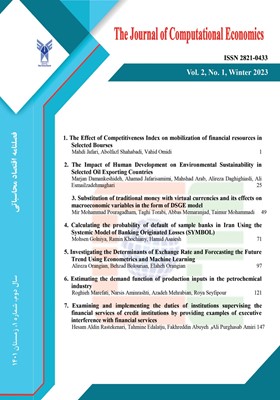The Impact of Human Development on Environmental Sustainability in Selected Oil Exporting Countries
Subject Areas : Computational economics
Mahshad Arab
1
,
Marjan Damankeshideh
2
*
,
Ahmad Jafari Samimi
3
,
Alireza Daghighi Asli
4
![]() ,
Ali Esmaeilzadeh Maghari
5
,
Ali Esmaeilzadeh Maghari
5
1 - Faculty of Economics and Accounting- Islamic Azad University central Tehran branch
2 - Faculty of Economics and Accounting, Islamic Azad university, Central Tehran Branch
3 - Faculty of Economics and Administrative Sciences, University of Mazandaran Babolsar, Iran
4 - Faculty member of Economics & Accounting, Islamic Azad University, Central Tehran Branch
5 - Dean of the faculty of Economics and Accounting and Member of academy in Islamic Azad University, Central Tehran
Keywords: , , "Sustainabilty", , "environmental sustainability", , "human development", , "environmental Kuznets curve", , "oil exporting countries",
Abstract :
In the broadest sense, sustainability means the ability to maintain or support a process continuously over time. To maintain the sustainability and sustainable development of society, we need to meet the demands of today's generation without compromising the needs of future generations. Sustainability has three dimensions: economic, social and environmental, the latter having the most decisive weight. In the 2000s and 2010s, multiple experimental studies were conducted on sustainability employing an experimental model based on the Kuznets curve. Moreover, in recent years, the two concepts of human development and sustainability have been extensively addressed in the development literature. Various studies have considered human beings as a substantial factor in the development of different societies. The composite index of human development has various dimensions that may affect sustainability and specifically environmental sustainability. Plus, exorbitant oil revenues in oil-producing and exporting countries have had a significant impact on human development in these countries. Therefore, we can classify these countries into three groups of oil-rich countries with high human development, oil-rich countries with medium human development and oil-rich countries with low human development. In this paper, to investigate the impact of the human development index in 35 major oil-exporting countries around the globe, we applied the panel data method and Kuznets function for the data from 2010 to 2019. The result of the econometric model estimation demonstrates that the greater the human development index, the higher the environmental sustainability in these countries.
_||_

